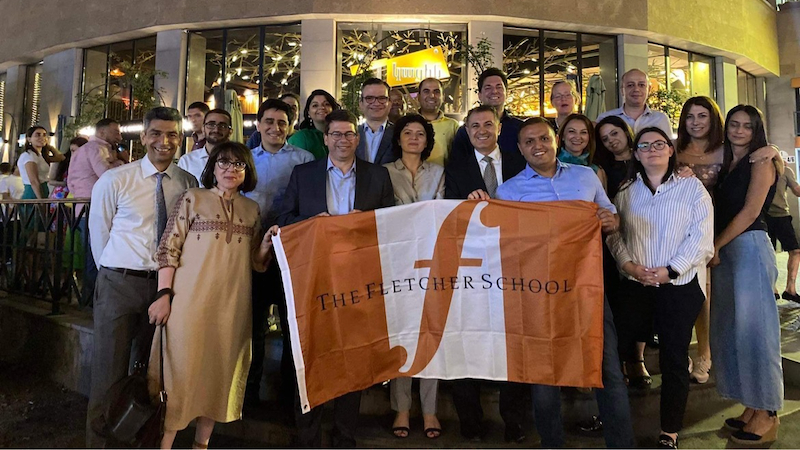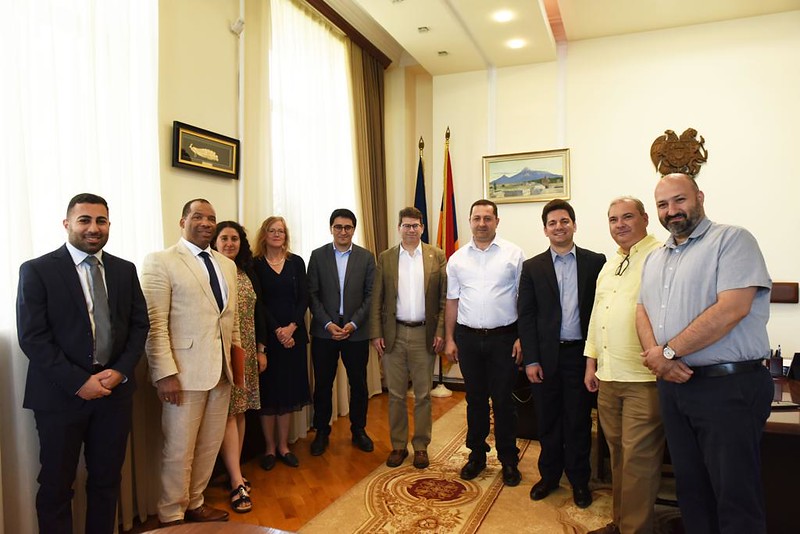
Fletcher Faculty Engage with Policymakers, Scholars, and Alumni in Armenia
By Alex Avaneszadeh, MALD 2023 Candidate, The Fletcher School
On July 12, 2022, the Fletcher Russia and Eurasia Program Assistant Director, Arik Burakovsky, along with Fletcher faculty members Daniel Drezner, Monica Toft, Josephine Wolff, and Jeffrey Taliaferro, arrived in Yerevan, Armenia for a five-day visit. The Fletcher delegation met with Armenian and Russian scholars, U.S. and Armenian policymakers, and Fletcher alumni. The Fletcher School faculty’s trip to Yerevan revolved around acquiring a better understanding of Armenian academia, the country’s current political-economic situation, and the impact of Russia’s war in Ukraine on Armenia and the wider region.
In particular, the faculty delegation met with Lynne Tracy, the U.S. Ambassador to Armenia; Martin Galstyan, the Governor of the Central Bank of Armenia; Mikayel Hovhannisyan, Yerevan State University Vice Rector; Zohrab Mnatsakanyan, the former Minister of Foreign Affairs; and Karin Markides, American University of Armenia President.
On the first day, Professor Taliaferro gave a lecture on neoclassical realist theory to students of political science and international relations at Yerevan State University. Taliaferro’s seminar discussed international relations from the perspective of global superpowers, as well as the political behavior of small states, like Armenia, within the neoclassical realist paradigm.
The following day, the faculty delegation met with U.S. Ambassador Lynne Tracy to discuss political developments in Armenia starting from Armenia’s 2018 Velvet Revolution, including the political climate around the country’s domestic and foreign policy post-2020 Nagorno-Karabakh War.
That same day, the faculty members visited Armenia’s Central Bank to meet with the bank’s governor, Martin Galstyan. The meeting revolved around understanding the various factors contributing to Armenia’s current economic state, including the positive economic impact of the large influx of Russian migrants to Armenia who are looking to avoid the consequences of the Western sanctions regime against Russia.
“I was interested in the perspective of the governor of the Central Bank and his ideas about the opportunities for Armenia to capitalize on people leaving Russia and Ukraine right now, especially around developing the country’s tech sector,” said Professor Wolff.
Similar to Governor Galstyan’s economic points about Armenia’s geographic position, former Minister of Foreign Affairs, Zohrab Mnatsakyan, explained to Fletcher faculty members the difficult geopolitical and normalization situation that Armenia faces with Azerbaijan and Turkey. He also addressed the political-economic interests and engagement of multiple superpowers in the region, including Russia and Iran.
Taliaferro highlighted that “our meetings with current and former officials at the Central Bank of Armenia and the Ministry of Foreign Affairs, several of whom are Fletcher alumni, provided me insights into the geostrategic and economic challenges confronting Armenia, as well as some of the opportunities Armenia might exploit.”
Professor Toft described Armenia as being a “terrific venue for the meeting in that it is positioned between the major players, and as a small state with tense relations with neighbors, notably Turkey. The conversations with our Armenian colleagues revealed just how difficult, complex, and historically fraught the war in Ukraine is and how it is impacting individual states, the region and global trade and politics.”
As the Fletcher faculty delegation’s trip came to a close, Professor Drezner expressed that “we had extremely productive meetings with an array of Armenian policymakers and academics. The large pool of Fletcher alums in Yerevan made the trip almost feel like an alumni reunion!”
Fletcher’s alumni base in Armenia is relatively large, ranging from former and current Armenian government officials to university academics. Many of the Fletcher Armenia alumni were participants of the Tavitian Scholars Program, a six-month rigorous academic program with an interdisciplinary curriculum meant to build individual and institutional capacity for those working in the government of the Republic of Armenia.

